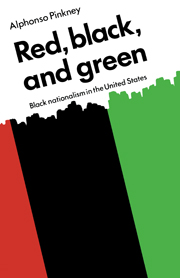Book contents
- Frontmatter
- Contents
- Preface
- 1 Introduction
- 2 The black nationalist tradition
- 3 Marcus Garvey and the Universal Negro Improvement Association
- 4 Malcolm X and the rise of contemporary nationalism
- 5 The impact of contemporary nationalism on the black community
- 6 Revolutionary nationalism: the Black Panther Party and other groups
- 7 Cultural nationalism
- 8 Religious nationalism
- 9 Educational nationalism
- 10 Black nationalism and liberation
- Epilogue
- Notes
- Index
3 - Marcus Garvey and the Universal Negro Improvement Association
Published online by Cambridge University Press: 02 February 2010
- Frontmatter
- Contents
- Preface
- 1 Introduction
- 2 The black nationalist tradition
- 3 Marcus Garvey and the Universal Negro Improvement Association
- 4 Malcolm X and the rise of contemporary nationalism
- 5 The impact of contemporary nationalism on the black community
- 6 Revolutionary nationalism: the Black Panther Party and other groups
- 7 Cultural nationalism
- 8 Religious nationalism
- 9 Educational nationalism
- 10 Black nationalism and liberation
- Epilogue
- Notes
- Index
Summary
When Marcus Garvey arrived in the United States in March 1916, he found a powerless and demoralized black population. Both Booker T. Washington and Bishop Henry Turner had died in 1915, and although W.E.B. DuBois was active in intellectual circles, he did not have a mass following among the poor blacks. Garvey arrived at a time when there was no black leader of national prominence who commanded a following among the masses of black people. Though not an immediate success when he arrived in Harlem, within a few years Garvey was able to build the largest organized black nationalist movement in American history, and indeed in world history, for the Universal Negro Improvement Association was worldwide in its organization.
Conditions among blacks in post-World War I America
Garvey's greatest successes were achieved in the United States, and the accomplishments of the movement he was to lead were in part the result of conditions facing black people in this country after World War I. The second decade of the twentieth century was one of massive black migration from the rural South to the urban North. Estimates on the number of persons leaving the South during this decade vary, but many put the number at about one million, or 10 percent of the total black population.
Blacks in the South had already been effectively disfranchised, and southern whites, with the approval or at least the acquiescence of the federal government, were determined that blacks would remain slaves in principle, if not in name.
- Type
- Chapter
- Information
- Red Black and GreenBlack Nationalism in the United States, pp. 37 - 56Publisher: Cambridge University PressPrint publication year: 1976



